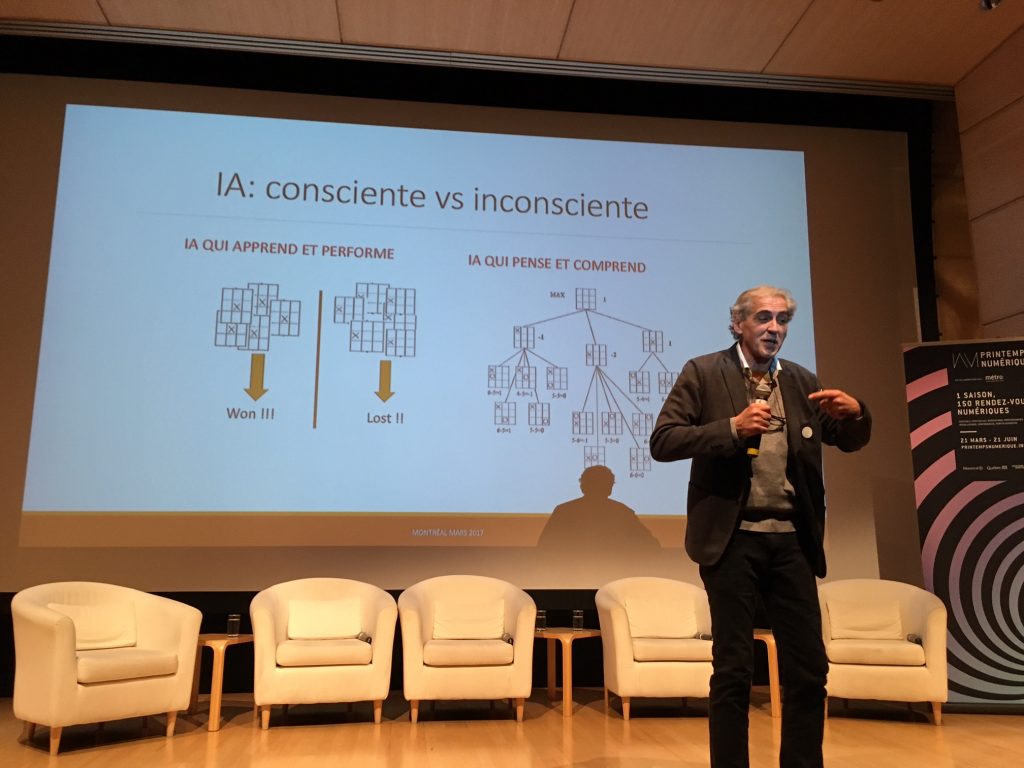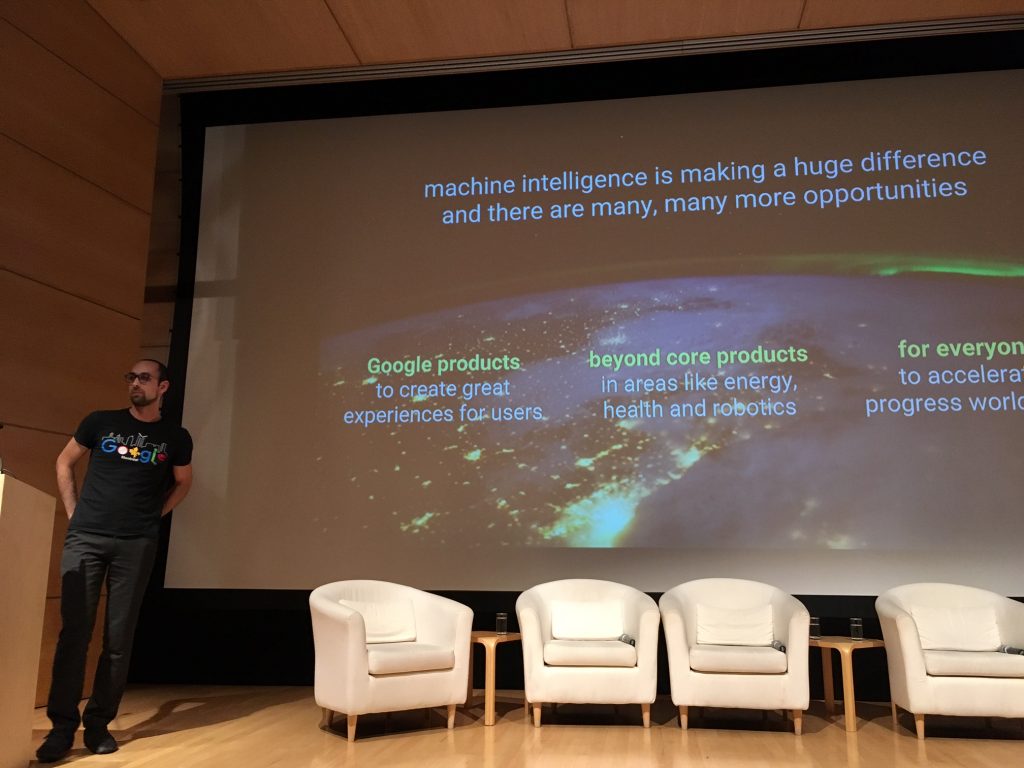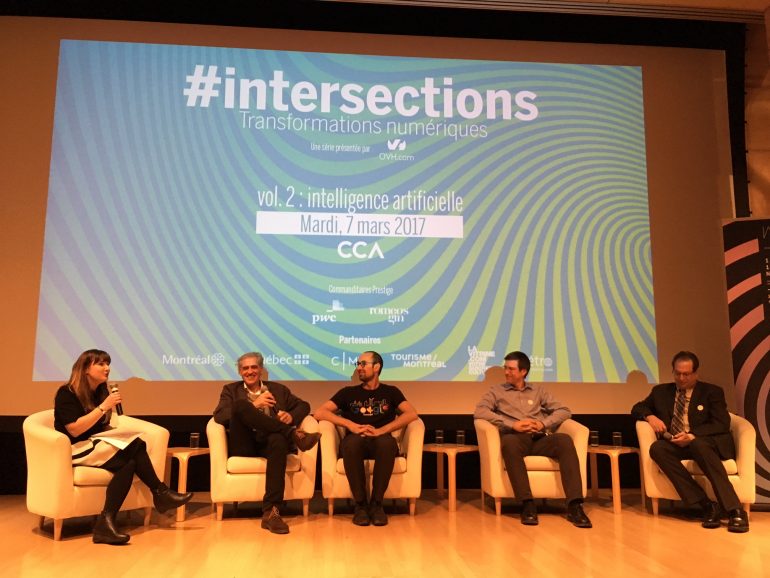Pour lire cet article en français, cliquez ici.
The second edition of the Printemps numérique #intersections series on artificial intelligence (AI) was held on March 7 at the Canadian Centre for Architecture. Four experts were invited to discuss issues in Montreal’s growing AI industry.
Among the speakers were Hugues Bersini, professor at the Université Libre de Bruxelles (ULB) and co-director of the laboratory of the Institute for Interdisciplinary Research and Development in Artificial Intelligence of ULB (IRIDIA); Gheorghe Comanici, Chrome developer for Google Montreal; Guillaume Chicoisne, director of scientific programming for the Institute of Data Enhancement (IVADO); and Dr. Jeffrey A. Goldstein from the IBM-Watson Center of Competency.
In a nod to the theme of the conference, each guest was announced by a pre-programmed voice that sounded like Siri.
At the beginning of the panel, the speakers noted that Montreal is a particularly fertile breeding ground for AI research. “Deep learning and operational research are two approaches that, at the level of university research, are highly developed in Montreal,” said Chicoisne.
Chicoisne adds that the diverse talent of the city means that it can build strong teams coming from a variety of perspectives.

“If we build a team with only ‘old white men’, we would not have the best team,” he continued. “We must have women, young people, old people, people of different cultures and languages; and cities like Montreal [can] confront their work with different cultures with different languages, and build complex teams in which computers will very naturally find their place not as adversaries or competitors, but as useful partners.”
That said, one drawback to this situation is the migration of Montreal talent to California companies. “We are already in a shortage of specialists because of dynamics that we saw on the American west coast, where a student who has not even completed his master’s degree might receive a six-figure job offer. We have a big problem with the succession and availability of the workforce.”
To counter this skill leak, the Montreal ecosystem nevertheless has a good hand to play. “The big advantage we have, especially in teams that work on deep learning in Montreal, is that we have rock stars,” Chicoisine continued. “There are people who come to work here because they feel like they are in Woodstock! They spend time with people who help them dream.”
While for many, AI is a world of possibilities with very positive connotations, others are loudly voicing their fears. That was clear when questions were opened to the public. Security issues, Big Brother, job losses; everything goes.

“Literature on AI is often a critical, frightened, panicked literature,” said Bersini.
But the speakers made the argument that it’s useless to get upset because whether we like it or not, the technology is gaining momentum. “Technology is like a rolling ball: we can change the road, but it will always go down,” said Comanici. “The key is really to encourage education.”
And it doesn’t mean that the majority of jobs are going to be affected. “We must beware of the prophecies in computer science,” said Bersini. “The world is changing very quickly, so to say that in 20 years, 40 percent of existing jobs will disappear, is nonsense!”
“We are seeing an evolution of the workforce,” said Goldstein. “The goal is not to erase these jobs, but simply to give much more effective solutions.”
For this reason, governments shouldn’t delay in making social choices in order to smooth the transition to becoming smart cities. “Governments are a bit like us: they don’t know how to approach the problem or what solutions to offer,” said Chicoisne. “They think, they listen to us a lot, but there is not much that’s really palpable and effective coming out right now.”
“If we entrust part of our lives to algorithms, we will have to agree on the nature of societal functions,” Bersini said. “What do we say is for the common good? What level of equality do we want in our societies?”
In order for AI to remain good news, “It will be necessary to quickly regain control of the power acquired by the GAFA [Google-Amazon-Facebook-Apple] as they are in the process of taking over these technologies in an extraordinary way, because they have a concentration of brains, a concentration of technology and a concentration of data like no other lab,” warned Bersini, who nevertheless has great faith in these technologies as solutions to the various environmental, economic, and social issues.


